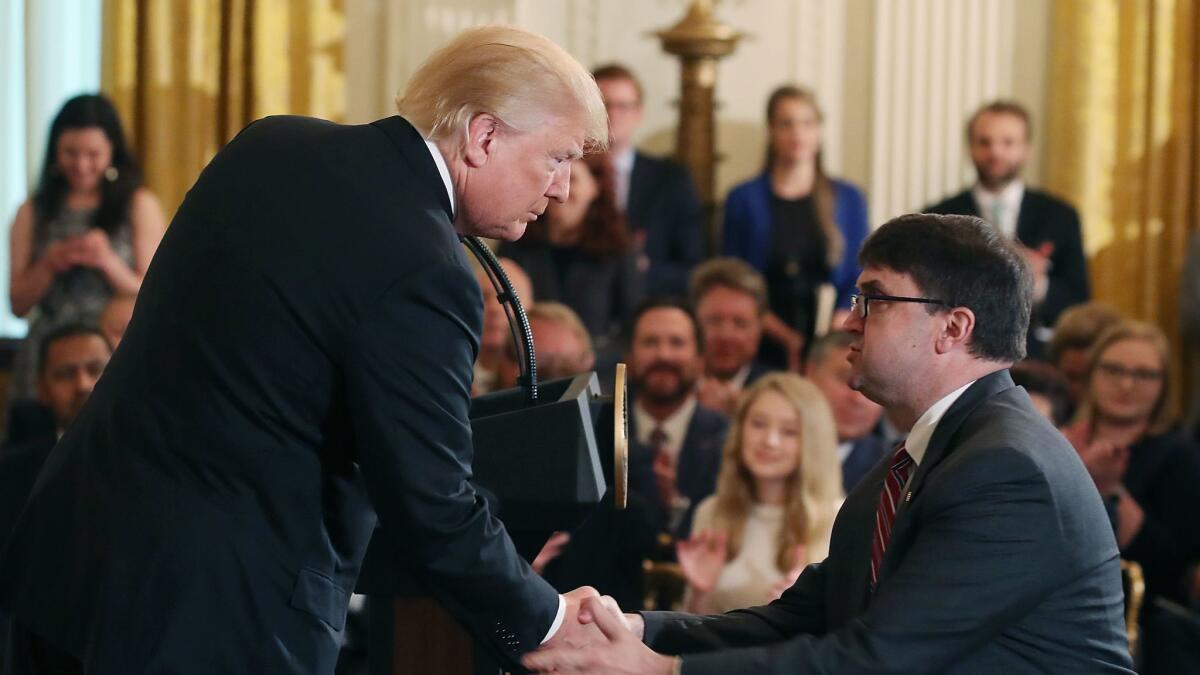Burned once, Trump turns to a more conventional choice for Veterans Affairs secretary

- Share via
Reporting from Washington — President Trump on Friday named a seasoned government official to be secretary of the troubled Veterans Affairs Department after his first, unconventional pick — his White House physician — withdrew amid allegations of wrongdoing. The new nominee, Robert Wilkie, has been the agency’s acting secretary since late March.
If confirmed by the Senate, Wilkie would take over the second-largest federal department, one that has been on the defensive for years over complaints of inadequate service to veterans. Trump fired his first secretary, David Shulkin, nearly two months ago; his next choice, White House physician Ronny Jackson, dropped out of the confirmation process after reports of misconduct and mismanagement, which Jackson denied.
Follow the latest news of the Trump administration on Essential Washington »
Trump’s announcement of the nomination apparently came as a surprise to his choice. Introducing Wilkie along with other Cabinet members at an unrelated White House event on prison policies, the president said, “He doesn’t know this yet, that we’re going to be putting his name up for nomination to be secretary of the Veterans Administration. Fantastic.”
Wilkie, an Air Force reservist, has been the interim head of Veterans Affairs — its name was changed in 1988 — while also serving as undersecretary of Defense for personnel and readiness. He served as an assistant secretary of Defense in the George W. Bush administration under Donald H. Rumsfeld, among other national security positions. More recently, he served as a senior advisor to Sen. Thom Tillis, a North Carolina Republican.
Unlike Jackson, whom Trump seemingly nominated on a whim — for being “out of central casting” — and without the usual background vetting, Wilkie has experience with the Senate confirmation process. He was confirmed for his current, lower-profile Pentagon position in November by a voice vote and has prepared other nominees, including Defense Secretary James N. Mattis, for the sometimes grueling process. Still, he is unlikely to take his own approval for granted.
Sen. Jon Tester of Montana, the top Democrat on the Veterans Affairs Committee whose scrutiny of Jackson led to his withdrawal, said in a statement that he has “a good working relationship with Acting Sec. Wilkie and I look forward to sitting down with him again to have an in-depth conversation about his vision and plan for the V.A.”
The committee’s chairman, Republican Sen. Johnny Isakson of Georgia, offered similar qualified praise. He said he “enjoyed my time getting to know Robert Wilkie” and “look forward to learning more about his long-term views for the V.A.,” including his plans to implement a veterans measure passed by the House this week and awaiting a Senate vote.
The measure, known as the “V.A. Mission Act,” allows more private-care options for veterans, a priority for Trump and other Republicans. But the issue is contentious among veterans and it played a key role in Trump’s ousting of Shulkin, who opposed the idea.
Wilkie spoke favorably about the House bill from the White House briefing room on Thursday, noting that it passed with bipartisan backing and support from 38 veterans organizations. He emphasized that the bill would consolidate community programs and make it “much easier for our veterans to obtain care that they need at the moment that they need it, in homes and in facilities closest to where they live.”
That televised appearance — in which Wilkie also praised Trump’s generosity for donating part of his presidential salary to the Veterans Affairs Department — may have been something of a final screen test for Wilkie. Trump is known to measure advisors by their ability to speak up for him before the cameras.
Though the job lacks the high profile of some Cabinet positions, it is one of the toughest and most important politically for Trump, given the influence of veterans and their families as voters. Trump campaigned on fixing the health system for veterans, which has been the subject of complaints, especially about long wait times.
Veterans groups and lawmakers had a measured response to the nomination. The group Iraq and Afghanistan Veterans of America expressed relief that “after weeks of drama and tumult, we finally have a new nominee,” but remained noncommittal.
“Like any other candidate, Mr. Wilkie will have to prove to millions of veterans nationwide that he is up to the mammoth, sacred leadership task,” the group’s leader, Paul Rieckhoff, said in a statement.
Twitter: @noahbierman
UPDATES:
2:05 p.m.: This article was updated with additional details, background information and comments from Wilkie, lawmakers and veterans advocates.
This article was originally published at 9:20 a.m.
More to Read
Get the L.A. Times Politics newsletter
Deeply reported insights into legislation, politics and policy from Sacramento, Washington and beyond. In your inbox twice per week.
You may occasionally receive promotional content from the Los Angeles Times.











